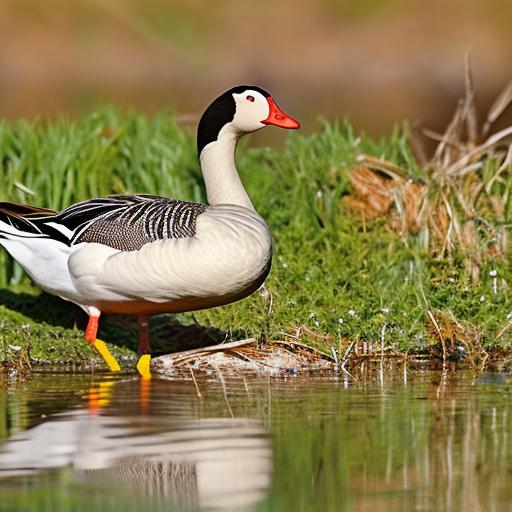When it comes to egg production, choosing the right geese breed is crucial for success. Different geese breeds have varying levels of egg production, temperament, and adaptability to different climates. Selecting the right breed can make a significant difference in the quantity and quality of eggs produced, as well as the overall health and well-being of the geese. It is important to consider factors such as egg production rate, size and color of eggs, temperament, and adaptability to your specific climate and environment. By understanding the importance of choosing the right geese breed for egg production, you can ensure a successful and sustainable egg production operation.
In addition to egg production, the right geese breed can also provide other benefits such as meat production, pest control, and even down feathers for insulation. Therefore, it is essential to carefully consider your goals and needs when selecting a geese breed for egg production. Whether you are a small-scale farmer looking for a sustainable source of eggs for your family or a commercial producer aiming to supply eggs to the market, choosing the right geese breed is a decision that should not be taken lightly.
Factors to Consider When Selecting a Geese Breed for Egg Production
When selecting a geese breed for egg production, there are several important factors to consider. One of the most crucial factors is the egg production rate of the breed. Some geese breeds are known for their high egg production, while others may not produce as many eggs. It is important to research and compare the egg production rates of different breeds to find one that meets your specific needs and goals. Additionally, consider the size and color of the eggs produced by each breed, as this can impact marketability and consumer preference.
Another important factor to consider is the temperament of the geese breed. Some breeds are known for being more docile and easy to handle, while others may be more aggressive or skittish. The temperament of the breed can impact the ease of handling and management, as well as the overall well-being of the geese. Additionally, consider the adaptability of the breed to your specific climate and environment. Some geese breeds are more suited to cold climates, while others thrive in warmer temperatures. By considering these factors, you can select a geese breed that is well-suited to your specific needs and environment.
Top Geese Breeds for Egg Production: A Comparison
There are several geese breeds that are well-known for their egg production capabilities. One of the most popular breeds for egg production is the Chinese Goose. This breed is known for its high egg production rate, producing up to 60-100 eggs per year. Chinese Geese are also known for their adaptability to different climates and their calm temperament, making them an excellent choice for egg production.
Another top geese breed for egg production is the Embden Goose. This breed is known for its large white eggs and high egg production rate, with some individuals laying up to 50-60 eggs per year. The Embden Goose is also prized for its meat production capabilities, making it a versatile choice for small-scale farmers and homesteaders.
The Toulouse Goose is another popular breed for egg production, known for its large brown eggs and high egg production rate. Toulouse Geese are also valued for their calm temperament and adaptability to different climates, making them a popular choice for both small-scale and commercial egg producers.
The Role of Genetics in Geese Egg Production
Genetics play a crucial role in geese egg production, influencing factors such as egg production rate, egg size and color, temperament, and adaptability to different climates. Selective breeding has been used for centuries to improve the egg production capabilities of geese breeds, resulting in breeds that are specifically bred for high egg production and other desirable traits.
When selecting a geese breed for egg production, it is important to consider the genetic background of the breed and its potential impact on egg production. By understanding the role of genetics in geese egg production, producers can make informed decisions when selecting breeds and breeding stock to optimize egg production capabilities.
Tips for Raising Geese for Egg Production
Raising geese for egg production requires careful management and attention to their specific needs. Providing a suitable environment with access to clean water, nutritious feed, and adequate shelter is essential for ensuring optimal egg production. Additionally, regular health checks and preventative measures such as vaccinations can help maintain the overall health and well-being of the geese.
It is also important to consider the social needs of geese, as they are social animals that thrive in groups. Providing ample space and opportunities for social interaction can help reduce stress and promote overall well-being, which can positively impact egg production.
Common Challenges in Geese Egg Production and How to Overcome Them
Geese egg production can be affected by various challenges such as disease outbreaks, predation, and environmental factors. Implementing biosecurity measures such as regular health checks, vaccinations, and proper sanitation can help prevent disease outbreaks and maintain the overall health of the flock.
Predation is another common challenge in geese egg production, as geese are vulnerable to predators such as foxes, raccoons, and birds of prey. Installing predator-proof fencing and providing secure shelter can help protect the flock from predation.
Environmental factors such as extreme temperatures and inclement weather can also impact egg production. Providing adequate shelter and access to clean water can help mitigate the impact of environmental challenges on egg production.
Finding the Perfect Geese Breed for Your Egg Production Needs
In conclusion, selecting the right geese breed for egg production is essential for success in this endeavor. By considering factors such as egg production rate, size and color of eggs, temperament, and adaptability to your specific climate and environment, you can find a breed that meets your specific needs and goals.
Top geese breeds for egg production include the Chinese Goose, Embden Goose, and Toulouse Goose, each known for their high egg production rates and other desirable traits. Understanding the role of genetics in geese egg production can help producers make informed decisions when selecting breeds and breeding stock.
Raising geese for egg production requires careful management and attention to their specific needs, including providing a suitable environment with access to clean water, nutritious feed, and adequate shelter. Common challenges in geese egg production such as disease outbreaks, predation, and environmental factors can be mitigated through proper management practices and preventative measures.
By carefully considering these factors and implementing best practices in geese management, producers can find the perfect geese breed for their egg production needs and ensure a successful and sustainable operation.
Meet Walter, the feathered-friend fanatic of Florida! Nestled in the sunshine state, Walter struts through life with his feathered companions, clucking his way to happiness. With a coop that’s fancier than a five-star hotel, he’s the Don Juan of the chicken world. When he’s not teaching his hens to do the cha-cha, you’ll find him in a heated debate with his prized rooster, Sir Clucks-a-Lot. Walter’s poultry passion is no yolk; he’s the sunny-side-up guy you never knew you needed in your flock of friends!







